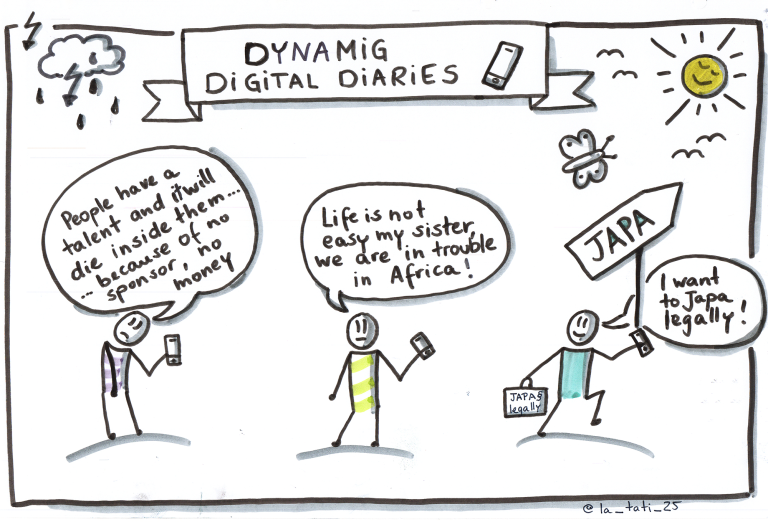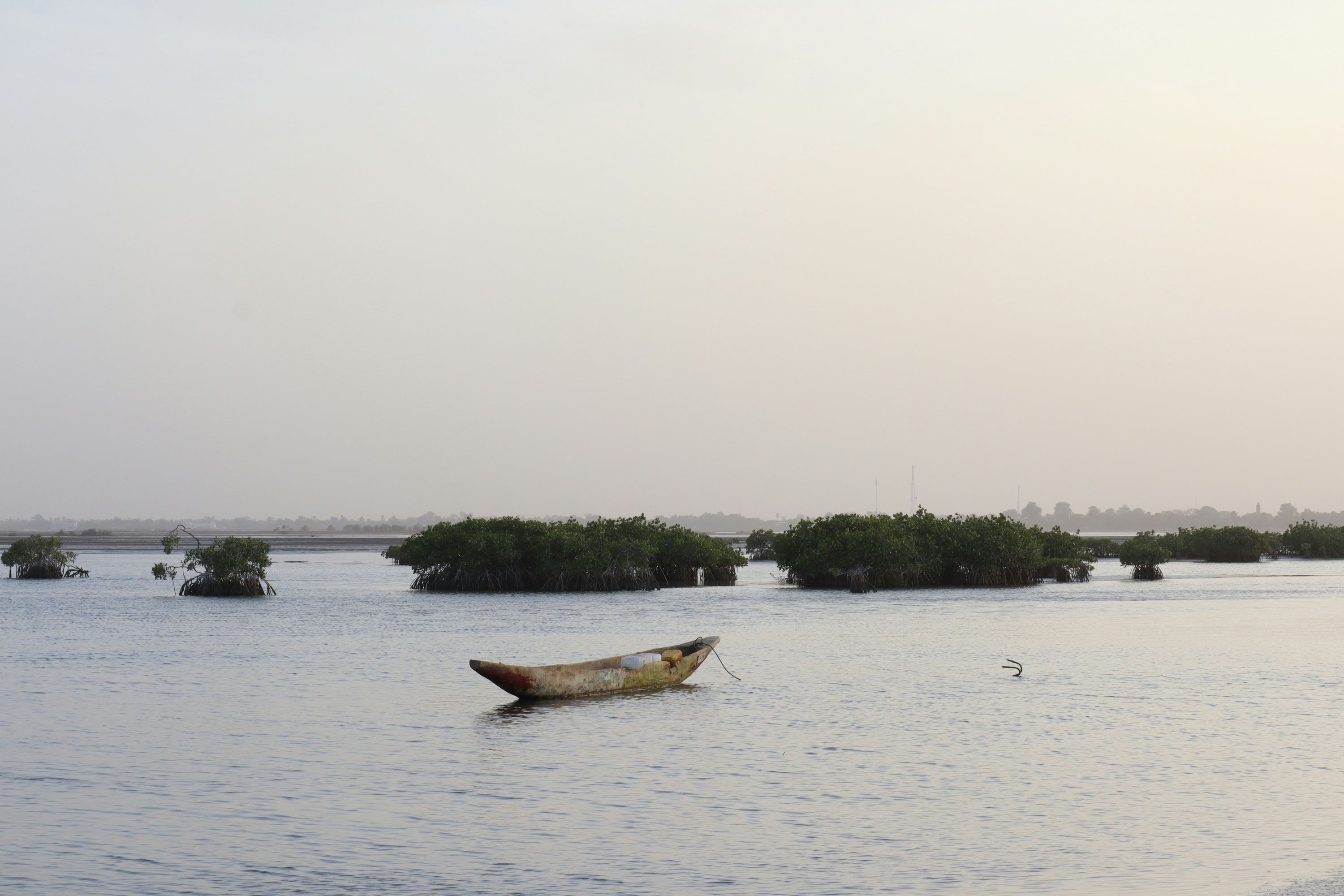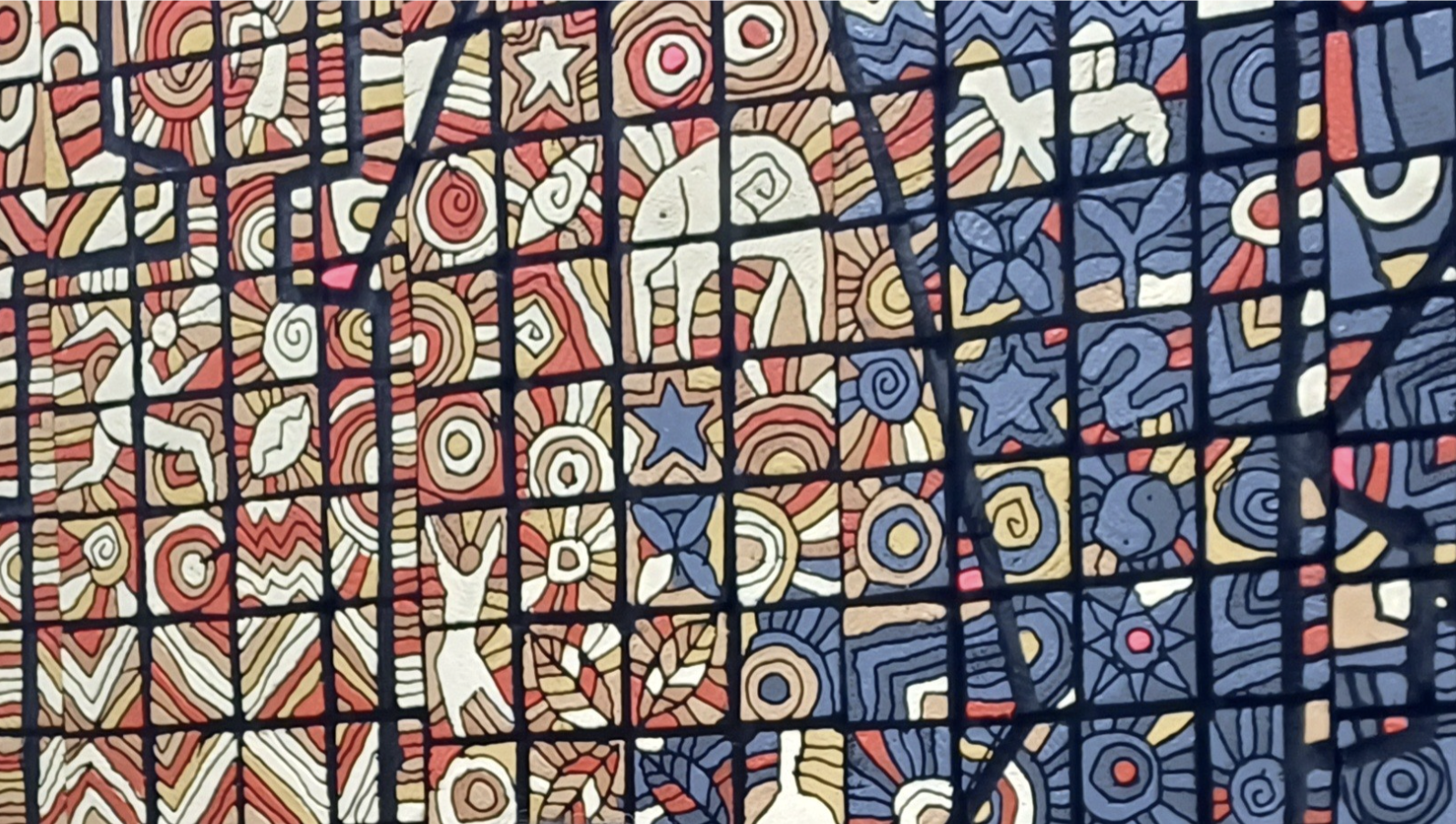The three stages of the pre-migration journey: Insights from digital diaries

Necla Acik reflects on her experience with digital diaries, where she followed 18 individuals over half a year to explore how migration decisions take shape. The diaries reveal that migration begins long before departure, unfolding as a pre-migration ‘journey’ with three key stages. Understanding this process is essential to ensuring safe migration pathways.
For the DYNAMIG project, I have been using digital diaries as a creative, participatory method to explore how migration decisions are made. Based at Middlesex University London, I followed aspiring migrants, migrants in transit and refugees in Kenya, Nigeria and Morocco – not by being physically present, but through audio, video and text diary submissions via WhatsApp.
Unlike traditional one-off interviews, digital diaries capture the migration process as it unfolds, revealing participants’ evolving thoughts, emotions and decision-making. This method adds not only a valuable longitudinal dimension to migration research but also shifts agency to the participants themselves, allowing them to choose when, how and what to share.
"Digital diaries capture the migration process as it unfolds, revealing participants’ evolving thoughts, emotions and decision-making."
Gathering the digital diaries
DYNAMIG team members conducted semi-structured interviews with over 150 people in Kenya, Nigeria and Morocco – people who are considering or planning to migrate, who have migrated or who are migrating for a variety of reasons. Eighteen of these participants took part in the digital diaries. Over a period of six months, they shared any changes in their migration aspirations and plans with me, as well as their general thoughts and feelings on migration. At every stage, we upheld rigorous ethical and data protection procedures.
I received a total of 286 diary entries in a range of formats – from voice messages (some up to 20 minutes long) and text reflections to short videos showing aspects of their daily lives, personal photographs and screenshots of conversations with family members, friends, colleagues, migration agents and social media influencers. Participants also shared Facebook, Instagram and TikTok videos that offered insights into life struggles in Africa, working conditions in the Gulf and Middle East, and the precarious situations facing sub-Saharan migrants in Morocco and refugees in Kenya.
The pre-departure ‘migration journey’
Migration does not begin with departure, nor end with arrival. It is a longer, often non-linear process shaped by social, legal, economic and emotional factors well before any physical movement takes place. Insights from the digital diaries clearly show that the pre-departure phase is critical in understanding the processes of migration decision-making, involving the gradual formation of migration intentions, the exploration of options and efforts to overcome financial and bureaucratic barriers. This ‘pre-migration journey’ can be broadly understood in three stages. These stages are not fixed but are fluid and overlap.
"Migration does not begin with departure, nor end with arrival. It is a longer, often non-linear process shaped by social, legal, economic and emotional factors well before any physical movement takes place."
First stage: The pledge to japa
The first stage is the formation of a mental commitment to migrate – what I refer to as ‘the pledge to japa’, borrowing from the Nigerian Yoruba term meaning “to run away”. This phase is typically shaped by deep frustration with deteriorating socio-economic and political conditions and a mounting sense of hopelessness about the future. Migration becomes not only a means of escape but also a path to opportunity and dignity – a “wise” choice, as one participant put it.
As Benjamin* from Kenya reflected: “As I embark on this journey, I do so with hope in my heart and determination in my spirit. I may not know what lies ahead, but I know that I am ready to face it, armed with nothing but my dreams and the courage to pursue them." This mental preparation demands emotional resolve and clarity, as for many it marks a profound and risky life decision.
Second stage: Exploring options
The second stage is characterised by actively searching for viable migration options, evaluating potential routes and weighing the risks and opportunities of each. For many, this is a daunting process, involving navigation of a complex and often opaque landscape of information, advice and actors – deciding, for example, whether to rely on recruitment agencies, trust the recommendations of friends or approach a promising broker.
Participants reported having to distinguish between what held genuine potential and what was likely to be a waste of time, or even outright fraud. At this stage, informal intermediaries played a prominent role. Respondents turned to a wide range of sources, including peers who had migrated, self-proclaimed migration advisers and influencers sharing tips and success stories via platforms like TikTok, Facebook and Instagram. This increased the pressure that those who try hard and don’t give up will eventually succeed.
This stage, then, reflects not only logistical uncertainty but also considerable emotional vulnerability, where “a leap of faith” is needed to embark on the migration journey, as expressed by Agnes* from Kenya, who aspires to migrate.
Third stage: Getting the documentation ready
The third stage involves preparing the practical requirements for migration: obtaining the necessary documents (such as birth certificates, passports and visas), securing employment contracts or study placements, and, most importantly, raising the funds to cover these costs.
This phase often brings inequalities and vulnerabilities into stark relief. Some participants lacked even basic identification documents, while others were unable to cover the costs of migration. Those without sufficient funds frequently relied on recruitment agencies to obtain employment, especially in the Gulf states, where employers sometimes cover the upfront fees. However, this route comes with serious risks: exploitative labour conditions, restrictions on mobility and limited recourse in cases of abuse, as the semi-structured interviews with Kenyan returnees revealed.
Persistent barriers and irregular pathways
For refugees in Kenya and sub-Saharan migrants in Morocco who had already left their home countries, additional barriers persisted, as many legal pathways and services were restricted to citizens. While some intended to settle in their current locations, others hoped for resettlement through UNHCR, leaving them in a state of prolonged uncertainty.
Despite aspirations for regular migration routes, the reality for many was a reliance on irregular pathways. Lawrence* from Nigeria, who referenced a Facebook video of migrants crossing the Mediterranean on an overcrowded fishing boat, told me: “From Africa to Spain with this thing you see those that don't have money to purchase visa to go abroad. Life is not easy my sister; we are in trouble in Africa.”

Research reflections and policy implications
From a research perspective, the diaries demonstrate their value as a methodological tool in migration studies. They enable the capture of real-time decision-making, provide longitudinal insight and place agency firmly in the hands of participants, making them co-creators of knowledge. They open new possibilities for understanding not only why people migrate, but also how they navigate the deeply personal, complex and often perilous process of preparing to do so.
The insights we captured through the digital diaries offer a unique and nuanced understanding of how migration decision-making unfolds – well before any actual movement takes place, underscoring the importance of the pre-departure phase as a critical focal point for both research and policy.
"The insights we captured through the digital diaries offer a unique and nuanced understanding of how migration decision-making unfolds – well before any actual movement takes place."
As many aspiring migrants, including refugees and those already in transit, face limited access to regular migration pathways and are often exposed to exploitative and high-risk alternatives, there is an urgent need for policymakers – in Africa and the EU alike – to invest in early-stage support and combat misinformation.
First, this could involve efforts to counter misinformation online and to regulate digital intermediaries, in order to reduce reliance on risky informal networks. Second, simplifying bureaucratic processes for obtaining passports and applying for visas is essential. Finally, extending legal migration opportunities to non-citizens and displaced populations would help ensure safer and more equitable migration pathways.
* The participants' real names have been modified, and ethics procedures were followed throughout the digital diary process.
Views and opinions expressed are those of the author only and do not necessarily reflect those of the European Union or the European Research Executive Agency (REA). Neither the European Union nor the REA can be held responsible for them.



